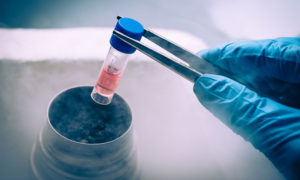Interstitial Cystitis (IC) Syndrome Samples
Bay Biosciences provides high quality, clinical grade, fresh frozen biopsy bio-specimens, cryogenically preserved sera (serum), plasma and peripheral blood mononuclear cells (PBMC) biofluid samples from patients diagnosed with Interstitial Cystitis Syndrome.
The sera (serum), plasma and PBMC biofluid specimens are processed from patient’s peripheral whole-blood using customized collection and processing protocols. The interstitial cystitis syndrome biopsy and biofluid samples are collected from unique patients diagnosed with interstitial cystitis syndrome and are provided to a valued pharmaceutical customer for research, diagnostics, discovery and drug development.
Detailed clinical data, interstitial cystitis syndrome patients history, symptoms, complete blood count (CBC), biopsy tissue, elevated biomarker levels, genetic and metabolic information, histopathological findings, annotations associated with interstitial cystitis syndrome specimens is provided to a valued customer for research, development and drug discovery.
The interstitial cystitis syndrome sera (serum), plasma and peripheral blood mononuclear cells (PBMC) biofluid are processed from patients peripheral whole-blood using customized collection and processing protocols.

Interstitial Cystitis (IC) Overview
Interstitial cystitis (IC) also known as painful bladder syndrome is a chronic condition causing bladder pressure, bladder pain and sometimes pelvic pain. The pain ranges from mild discomfort to severe pain. The condition is a part of a spectrum of diseases known as painful bladder syndrome. It is a feeling of pain and pressure in the bladder area. Along with this pain are lower urinary tract symptoms which have lasted for more than 6 weeks, without having an infection or other clear causes. IC, is a bladder condition that usually consists of multiple symptoms. Most IC patients have recurring pelvic pain, pressure, or discomfort in the bladder and pelvic region, and urinary (needing to go often) and urgency (feeling a strong need to go). Discomfort can range from a mild burning sensation to severe pain. The degree of discomfort can be persistent or infrequent. Some patients have periods of remission.
According to the Interstitial Cystitis Association, interstitial cystitis (IC) affects more than 12 million people people in the United States. Women are most likely to develop interstitial cystitis (IC) syndrome, 3 to 8 million women in the United States may have interstitial cystitis (IC) disease. That is about 3 to 6% of all women in the United States. On average, interstitial cystitis patients first start having problems in their 40s. The risk of getting it goes up as you get older. Children and adult men can get interstitial cystitis (IC) as well. Interstitial cystitis(IC) is a tricky condition. and is difficult to diagnose. Because interstitial cystitis (IC) has such a wide range of symptoms and severity, most experts think it might be several diseases. Although treatments can help manage the disease and make life with it better, there’s no cure for interstitial cystitis (IC) syndrome.
Signs and Symptoms of Interstitial Cystitis (IC)
The signs and symptoms of interstitial cystitis vary from patient to patient. If you have interstitial cystitis, your symptoms may also vary over time, periodically flaring in response to common triggers, such as menstruation, sitting for a long time, stress, exercise and sexual activity.
Following are the common signs and symptoms of Interstitial cystitis syndrome:
- Pain in the pelvis, vulva or between the vagina and anus in women patients
- Pain between the scrotum and anus in men (perineum) pain in the testicles, penis, or the area behind the scrotum.
- Bladder pressure and pain that gets worse as your bladder fills up
- Pain or discomfort while the bladder fills and relief after urinating
- Chronic pelvic pain
- A persistent, urgent need to urinate
- Frequent urination, often of small amounts, throughout the day and night (up to 60 times a day)
- For women patients pain during sexual intercourse
- For men, pain during orgasm or after sex
Symptoms and severity of interstitial cystitis (IC) is different for everyone, and some patients may experience symptom-free periods. Although signs and symptoms of interstitial cystitis may resemble those of a chronic urinary tract infection, there’s usually no infection. However, symptoms may worsen if a patient with interstitial cystitis gets a urinary tract infection. The bladder pain interstitial cystitis patients feel can range from a dull ache to piercing pain. Urinating may feel like just a little sting, or it can feel like serious burning. About 5% to 10% of the interstitial cystitis (CI) patients with get ulcers in their bladder.
Causes of Interstitial Cystitis (IC)
Exact cause of interstitial cystitis (IC) is not known, but researchers believe that several factors may damage the lining of the bladder and therefore trigger the interstitial cystitis (IC) disorder. Following are some of the possible causes:
- Autoimmune diseases
- Bacterial infection
- Trauma to the bladder lining (for example, from surgical procedures)
- Spinal cord trauma
- A problem with bladder tissue lets things in your pee irritate your bladder
- Inflammation causes your body to release chemicals that cause symptoms
- Something in the urine may damage the bladder
- A nerve problem makes the bladder feel pain from things that usually don’t hurt
- The immune system attacks the bladder
- Another condition that causes inflammation is also targeting the bladder
Risk Factors of Interstitial Cystitis (IC)
Following are the factors associated with a higher risk of developing interstitial cystitis (IC) syndrome:
- Sex: Women are diagnosed with interstitial cystitis syndrome more often than men. Symptoms in men may mimic interstitial cystitis, but they’re more often associated with an inflammation of the prostate gland (prostatitis).
- Skin and hair color: Having fair skin and red hair has been associated with a greater risk of developing interstitial cystitis.
- Age: Most people with interstitial cystitis are diagnosed during their 30s and 40s or older.
- Having a chronic pain disorder: Interstitial cystitis may be associated with other chronic pain disorder, such as irritable bowel syndrome or fibromyalgia.
Complications of Interstitial Cystitis (IC)
Interstitial cystitis can result in a number of health complications, including the following:
- Reduced bladder capacity: Interstitial cystitis can cause stiffening of the bladder wall, which causes your bladder to hold less urine.
- Lower quality of life: Frequent urination and pain may interfere with social activities, work and other activities of daily life.
- Sexual intimacy problems: Frequent urination and pain may strain your personal relationships, and sexual intimacy may suffer.
- Emotional troubles: The chronic pain and interrupted sleep associated with interstitial cystitis may cause emotional stress and can lead to depression.
Diagnosis of Interstitial Cystitis (IC)
There’s no test available to diagnose interstitial cystitis (IC) syndrome. Usually to make a diagnosis, your health care provider will first decide whether the symptoms are typical of interstitial cystitis (IC). Next, they need to rule out other health issues that might be causing the symptoms. Some doctors believe that interstitial cystitis (IC) is present if a patient has symptoms and no other cause for those symptoms is found. Others believe that more tests are needed to find out whether the patient has interstitial cystitis (IC). Usually If you go to your doctor complaining about bladder pain along with frequency and the urgency to pee, the next step is to rule out other conditions that maybe causing similar symptoms.
Both men and women patients would first need to rule out urinary tract infections, bladder cancer, sexually transmitted diseases, and kidney stones. In women patients, endometriosis is another possibility. For men patients, interstitial cystitis (IC) can be mistaken for an inflamed prostate gland or chronic pelvic pain syndrome.
Following are the diagnostics tests that can rule out other conditions:
- Urinalysis and urine culture: You’ll be asked to pee in a cup. It’ll be sent to a lab to check for infection.
- Postvoid residual urine volume: Using an ultrasound, this test measures the amount of pee that remains in your bladder after you go to the bathroom.
- Cystoscopy: A thin tube with a camera is used to see the inside of the bladder and urethra. This is usually done only if there is blood in the urine or if the treatment is not working.
- Bladder and urethra biopsy: A small piece of tissue is taken and tested. This is usually done during cystoscopy.
- Bladder stretching: Your bladder is filled with liquid or gas to stretch it out. This procedure is performed under anesthesia, sometimes this is also used as a treatment, this is done with a cystoscopy.
- Prostate fluid culture (in male patients): Your doctor will need to press on your prostate and milk a sample to test, this procedure is not commonly done.

Bay Biosciences is a global leader in providing researchers with high quality, clinical grade, fully characterized human tissue samples, bio-specimens and human bio-fluid collections from cancer (tumor) tissue, cancer serum, cancer plasma cancer PBMC and human tissue samples from most other therapeutic areas and diseases.
Bay Biosciences maintains and manages it’s own bio-repository, human tissue bank (biobank) consisting of thousands of diseased samples (specimens) and from normal healthy donors available in all formats and types. Our biobank procures and stores fully consented, deidentified and institutional review boards (IRB) approved human tissue samples and matched controls.
All our human human tissue collections, human specimens and human bio-fluids are provided with detailed samples associated patient’s clinical data. This critical patient’s clinical data includes information relating to their past and current disease, treatment history, lifestyle choices, biomarkers and genetic information. Patient’s data is extremely valuable for researchers and is used to help identify new effective treatments (drug discovery & development) in oncology, other therapeutic areas and diseases. This clinical information is critical to demonstrate their impact, monitor the safety of medicines, testing & diagnostics, and generate new knowledge about the causes of disease and illness.
Bay Biosciences banks wide variety of human tissue samples and biological samples including cryogenically preserved -80°C, fresh, fresh frozen tissue samples, tumor tissue samples, FFPE’s, tissue slides, with matching human bio-fluids, whole blood and blood derived products such as serum, plasma and PBMC’s.
Bay Biosciences is a global leader in collecting and providing human tissue samples according to the researchers specified requirements and customized, tailor made collection protocols. Please contact us anytime to discuss your special research projects and customized human tissue sample requirements.
Bay Biosciences provides human tissue samples (human specimens) from diseased and normal healthy donors; including peripheral whole-blood, amniotic fluid, bronchoalveolar lavage fluid (BAL), sputum, pleural effusion, cerebrospinal fluid (CSF), serum (sera), plasma, peripheral blood mononuclear cells (PBMC’s), saliva, Buffy coat, urine, stool samples, aqueous humor, vitreous humor, kidney stones, renal calculi, nephrolithiasis, urolithiasis and other bodily fluids from most diseases including cancer. We can also procure most human bio-specimens and can do special collections and requests of human samples that are difficult to find. All our human tissue samples are procured through IRB approved clinical protocols and procedures.
In addition to the standard processing protocols Bay Biosciences can also provide human plasma, serum, PBMC bio-fluid samples using custom processing protocols, you can buy donor specific sample collections in higher volumes and specified sample aliquoting from us. Bay Biosciences also provides human samples from normal healthy donors, volunteers, for controls and clinical research, contact us Now.
日本のお客様は、ベイバイオサイエンスジャパンBay Biosciences Japanまたはhttp://baybiosciences-jp.com/contact/までご連絡ください。


